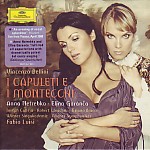Here is another terrific performance of this opera, better even in some ways than those starring Kasarova and Mei, Gruberova and Baltsa, Baker and Sills, Larmore and Hong–each of which is excellent and has plenty to recommend it. This one misses the white-hot intensity offered by some of the other singers, but for sheer beauty, it’s unbeatable.
We are aware from the start that neither Romeo nor Giulietta is a native Italian speaker, and to a sharp ear this can throw a wrench into the enjoyment process. Looking at the list above, there’s not an Italian among them either, but it seems more of an issue here. Perhaps that’s because the emphasis is on beauty of emission overall in this set–the “bel” part of bel canto–and if the language is not perfectly enunciated, some of Bellini’s mellifluousness is lost.
Baltsa’s and Larmore’s exciting exclamations put them in a very dramatic class, and sheer “loveliness” takes a back seat. But what the Latvian Elina Garanca has to offer is less dramatic commitment and pure enunciation than ravishing tone–and ravishing it is. An unbroken line of beauty at every register, with sincerity in her first aria, emotional sweetness in the duets with Giulietta, and stunning pathos in her final scene are invaluable assets. And happily, she’s not quite as non-committal as she seemed on her recent solo CD. She never takes vocal chances and only occasionally dips into anything like chest voice, but her Romeo is a successful undertaking–if not quite a knock-out, like Baltsa’s or Larmore’s.
Giulietta fits Anna Netrebko like a glove. Seamless legato, a perfect sense of the character’s melancholy, a stunning blend with Garanca, and an essentially youthful sound make her the Giulietta to beat. You certainly can find more subtleties (and impeccable Italian diction) in Sills’ characterization of the role–Netrebko’s shallowness is almost part of her charm–but to hear her spin the long melody of “Ah, quante volte” is to experience bliss. Somewhat mumbled bliss, but bliss nonetheless.
Tenor Joseph Calleja’s lyric-but-exciting sound is well used for Tebaldo; he rouses himself well for his opening aria and thrills with Garanca in their second-act duet. His delivery is wonderfully Italianate, and if you wished for anything it would be a bit more weight to the voice–he never sounds as outraged as he ought to. Tiziano Bracci sings Capelio with a younger than usual tone, and the same can be said for Robert Gleadow’s Lorenzo: they are both smallish parts, but they matter, and each has his heart in it.
Fabio Luisi leads with a slow but sure hand: with singers who sound this good, he can’t be blamed for wanting to bathe in their sound. The Vienna forces play handsomely and the chorus gets properly worked up in the first scene and the finale to the first act.
The Sills/Baker is a thoroughly honest reading, though Sills was recorded a bit late in her career and her top notes can grate; the Baltsa/Gruberova is ravishingly sung but the whole set is undermined by Muti’s rigidity; and the Kasarova/Mei offers a great Romeo and a one-toned Giulietta. The Larmore/Hong is probably the best representation of the work as a whole, but Garanca and Netrebko’s combined singing is so beautiful that I must recommend this set as well. [5/20/2009]
































